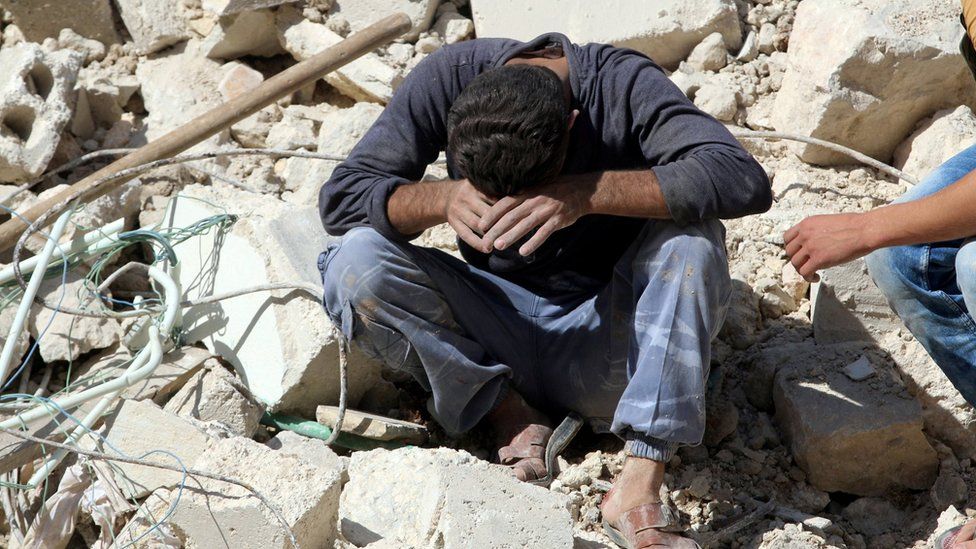Syria conflict: Aleppo a slaughterhouse, UN rights chief says
- Published

UN human rights chief Zeid Raad Al Hussein has described the Syrian city of Aleppo as a "slaughterhouse".
In a speech, he said the siege and bombardment of Aleppo's rebel-held east were among the "crimes of historic proportions" being committed in Syria.
Almost 500 people have been killed and 2,000 injured since government forces, backed by Russian air strikes, launched an assault on the east a month ago.
Syria's government has said civilians are suffering because of "terrorists".
Meanwhile, the UN said a lack of security guarantees had forced it to delay plans to carry out medical evacuations from Aleppo on Friday during the second 11-hour "humanitarian pause" declared unilaterally by the government and its ally, Russia.
Russia has said it will also suspend air strikes between 08:00 and 19:00 local time (05:00-16:00 GMT) on Saturday to allow civilians and rebels to leave the city via safe corridors.
However, very few people have reportedly taken advantage of the offer, with rebel factions asserting that it would amount to forced displacement and surrender.
Aleppo, once Syria's largest city and the country's commercial and industrial hub, has been devastated by fighting since 2012. It has been left divided roughly in two, with President Bashar al-Assad's forces controlling the west and rebels the east.
At the start of September, troops and Iranian-backed militiamen severed the rebels' last route into the east and placed its 275,000 residents under siege.
Two weeks later, following the collapse of a nationwide truce brokered by the US and Russia, the government launched a ground offensive to take full control of the city, accompanied by an aerial bombardment of unprecedented scale and intensity.
At an emergency session of the UN Human Rights Council in Geneva on Friday, Mr Zeid warned that "crimes of historic proportions" were being committed in eastern Aleppo and elsewhere in Syria.
"The ancient city of Aleppo, a place of millennial civility and beauty, is today a slaughterhouse - a gruesome locus of pain and fear, where the lifeless bodies of small children are trapped under streets of rubble and pregnant women deliberately bombed," he said.
Mr Zeid added that his staff had "documented violations of international humanitarian law by all parties in Aleppo".
"Armed opposition groups continue to fire mortars and other projectiles into civilian neighbourhoods of western Aleppo, but indiscriminate air strikes across the eastern part of the city by government forces and their allies are responsible for the overwhelming majority of civilian casualties.
"These violations constitute war crimes. And if knowingly committed as part of a widespread or systematic attack directed against civilians, they constitute crimes against humanity."
The commissioner said the failure of the international community - particularly the UN Security Council - to protect civilians and halt the bloodshed "should haunt everyone of us".
Syria's permanent representative to the UN, Hussam al-Din Ala, made a visibly angry statement afterwards, insisting that the Syrian government was waging a battle against terrorism.
Later, the charity Save the Children warned that aid workers and medical professionals in eastern Aleppo were reporting the widespread use of cluster bombs, which are banned under international law.
It cited the Violations Documentation Centre, an activist-run site, as recording 137 cluster-bomb attacks in Aleppo between 10 September and 10 October - a 791% increase on the average of the previous eight months.